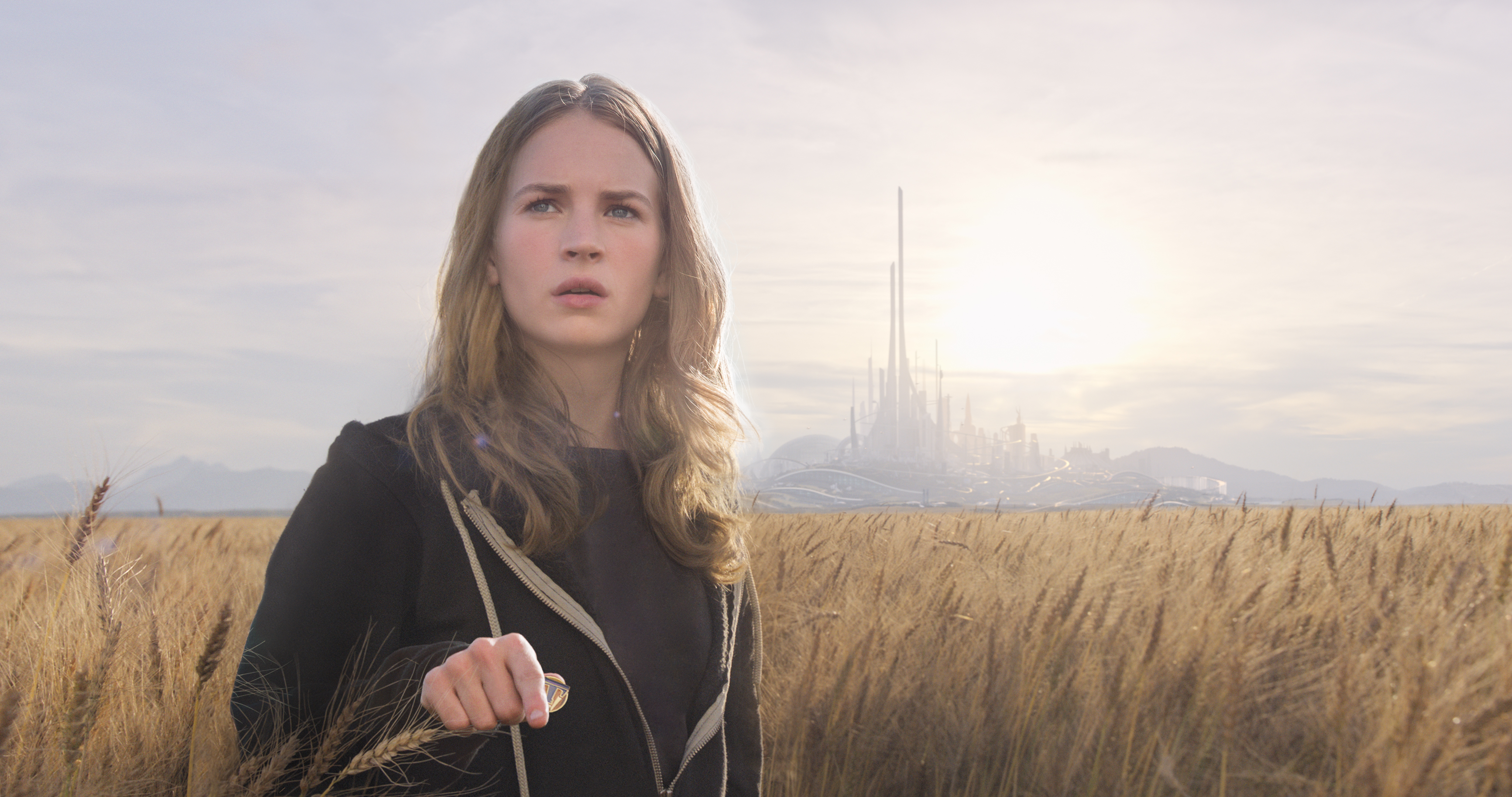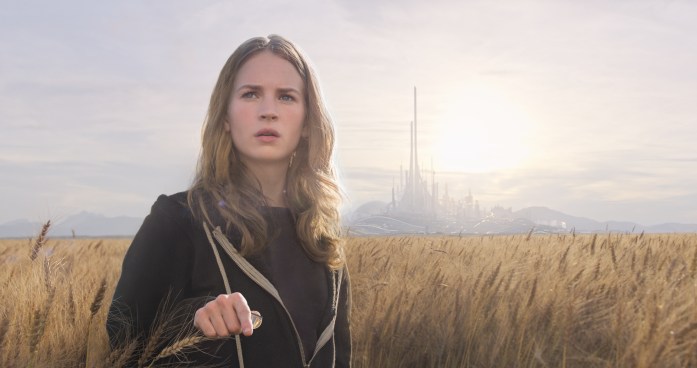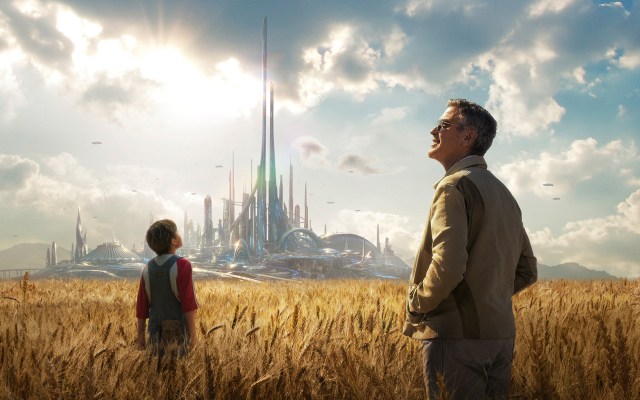Review: Tomorrowland is a Disneyfied Take on The Disaster Film
A Little Too Preachy and With Questionable Performances, but Great Visuals and Worthy Message

One of the interesting things about Disney’s Live Action Films, is the fact that they usually mirror the current trends in Hollywood, and take a family friendly approach to the genre and spin it with a Disney philosophy. Sometimes this leads to good movies (I’ll defend Condorman to my death) and sometimes the results are a bit more questionable (anyone remember that Star Wars rip-off Black Hole). All this is to say, the fact that Tomorrowland is the closest we’ll get to Disney taking on the apocalypse and the end of the world on screen seems fitting, considering it is coming out in-between Mad Max: Fury Road and San Andreas. We love end the world movies…or perhaps I should say, Hollywood thinks we love end of the world movies because we keep paying to see them. Lately I’ve been using the term “disaster-porn” because I really don’t look forward to seeing another natural disaster or city torn apart on film. Tomorrowland may not be as crazy as Mad Max or horrific as San Andreas (boy, I’m worried about that movie), but it does have a lot of connections to Interstellar and another Brad Bird movie…The Iron Giant.
The movie stars George Clooney who begins the film by recounting a story of his childhood when he went to the world’s fair in 1962 (apparently Clooney is playing a man in his late 60s in this movie, so looking good George). Then they put us back in the present to tell the story from Britt Robertson’s perspective (and feature about 30 seconds of Judy Greer. Robertson plays Casey Newton, the daughter of a NASA engineer (Tim McGraw) who is primarily an optimist. She’s smart and resourceful and driven, but her dominate personality seems to be that she’s an optimist. Fortunately Robertson is pretty good in the role and gives her just enough spunk so she doesn’t come across as precocious or unnatural in what could have easily come across like an older, modern-day Pollyanna.
One person who is intentionally not naturalistic is young Raffey Cassidy, who plays mysterious Athena. She is a bit off because the story calls for it, but she’s great in the film, and she and Robertson have great chemistry as a duo…I could have used a few more scenes of just the two of them, especially when they are doing action scenes (remember how great Gogo and Lemon were in Big Hero 6…kind of like that). Unfortunately, Clooney isn’t exactly right for the role and kind of brings the energy down, despite the action increasing when he finally shows back up. I’m sure he liked being in a big summer movie and the message is close to his heart, but he just seems to relaxed and uninterested in playing a character, when he should have shown a bit more focus and commitment. His lack of playing with Robertson and committing, because he seemed to be a primary reason some of the big sequences are a little ho-hum. The friend I saw the movie with mentioned that a number of people felt that Clooney should have changed roles with Hugh Laurie, who plays some person with power (I wasn’t sure what his title was) in Tomorrowland, and is a pretty generic villain. I tend to agree that their performances would have been more interesting if they had switched roles, and added a bit more dimension to the characters.
Now, all is fine and good, but what about that promised Tomorrowland…I don’t know! Looking at, it seems like a pretty cool place. Kind of like that city in Guardians of the Galaxy crossed with Disney World’s Tomorrowland. There are shiny outfits and lots of smooth metal buildings and transportation, and everything looks clean, and everyone seems to spend their time flying around. But we don’t have a sense of what they do, why they do that, and the socio-political organization in place. Which would be fine, if we didn’t have a long monologue from Laurie about why they are thriving and our world is struggling. Why does their society not have these problems…and what kind of problems do they face in this society we aren’t accounting for? I don’t know and the movie certainly doesn’t want to open that can of worms.
The issue we have seems to be that being a kids movie (more young adult than younger kids for violence) they really can’t show the end of the world, and instead have to talk about it, why it seems inevitable, and why we love the idea so much. The monologue is a bit awkward and preachy to say the least. Everything they are telling the audience is spot on, but sitting in a movie theater, it becomes very uncomfortable when characters seem to be telling you the themes of a movie directly and explaining what the film’s lesson is (like being given the study questions at then end of a book). It feels like you in the audience are being scolded by the filmmakers, and you disengage from the characters and narrative when that happens…which I did.
The movie’s script by Damon Lindelof and Brad Bird is pretty clunky too. Anytime a movie starts with a flashback, you know it is being used as exposition because they aren’t sure how it thematically fits with the reset of the story. And I would have rather gotten into the action with Robertson, who is the film’s lead, and let Clooney tell his story late (if they had cut it down a little). And there is too much focus on “the mystery” in the middle section, especially because my friend told me that I was sort of confused because the marketing of the film provides exposition the movie choose not to have. Simplifying it and allowing for more natural dialogue on the big themes they clearly wanted to address would have worked better.
I completely understand the appeal of this kind of movie to Brad Bird, who no matter what I think about this movie’s story, has a great visual eye. It connects to aspects he seems to clearly love addressing in film…individual exceptionalism (The Incredibles, Ratatouille, and Mission Impossible: Ghost Protocol) and environmentalism. Regarding the environmental issues, Disney did it better with Wall-E, and Bird did it better with The Iron Giant, because both films focused on the emotional impact of those films moving audiences to want to act, not scolding them the way this film does.
For a movie which wants to desperately to be OPTIMISTIC (say it with a smile or you don’t mean it), the movie isn’t very inspiring…you just feel kind of bad walking out of the theater.
Lesley Coffin is a New York transplant from the Midwest. She is the New York-based writer/podcast editor for Filmoria and film contributor at The Interrobang. When not doing that, she’s writing books on classic Hollywood, including Lew Ayres: Hollywood’s Conscientious Objector and her new book Hitchcock’s Stars: Alfred Hitchcock and the Hollywood Studio System.
—Please make note of The Mary Sue’s general comment policy.—
Do you follow The Mary Sue on Twitter, Facebook, Tumblr, Pinterest, & Google +?
Have a tip we should know? [email protected]

